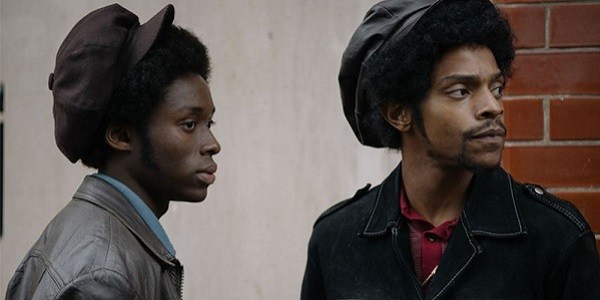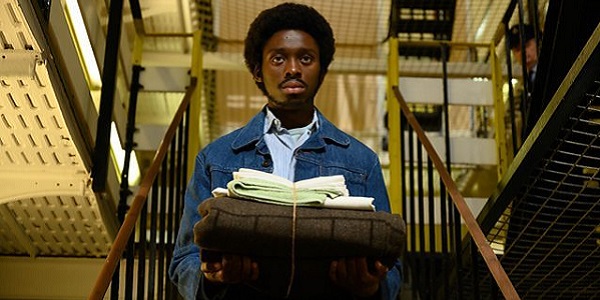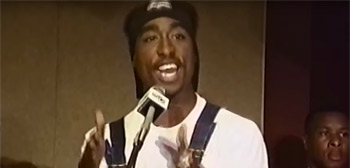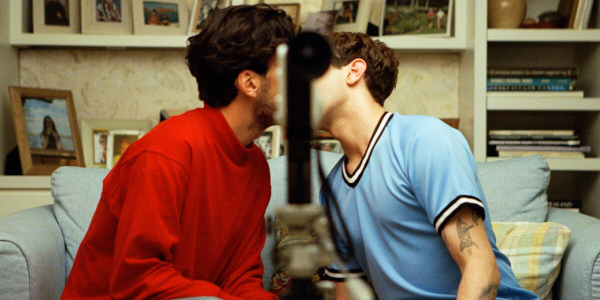SMALL AXE: ALEX WHEATLE: Growing Up, Rising Up
Four films into the five-film Small Axe anthology co-written and directed by Steve McQueen, I’m convinced that this cycle should be celebrated as the cinematic event of the year. In turning his masterful talents as a filmmaker to the telling of five stories about London’s West Indian community in the mid-twentieth century, McQueen has created a series of historical films that address our current moment, the long, dark history of racism and police brutality that brought us here, and the reasons for hope and celebration that have kept folks from giving up the fight all the while.
From Mangrove’s powerful look at the trial that brought the deep-seated racism of the Metropolitan Police in front of a judge, to Lovers Rock’s vibrant celebration of the house party as a safe space to live and love, to Red, White and Blue’s complex exploration of one Black man’s attempts to tackle racism inside the police force by becoming a cop himself, we now arrive at the story of celebrated author Alex Wheatle. Beginning with his loveless upbringing in a mostly white institutional care home, the film follows our hero to the South London neighborhood of Brixton, where he begins to create an identity for himself as part of a sound system. But a prison stint following the 1981 Brixton Uprising forces him to reexamine his past so he can plan for his future.
“For Me, It Was Always About the Music”
Alex Wheatle (newcomer Sheyi Cole) is treated poorly in a children’s home by nearly everyone around him; the white children bully him for the color of his skin and his enjoyment of reggae, while the adults jump at the chance to verbally and physically abuse him. Things change when Alex leaves their care (or lack thereof) to move into a hostel in Brixton. Despite his unfashionable clothes, earnest Surrey accent, and initially unquestioning sense of respect for authority, Alex is taken under the wing of an older friend named Dennis (Jonathan Jules), who decides to teach this wide-eyed young man how to view society with a more cautious and critical eye.

As Dennis angrily speaks of Babylon — the Rastafarian name for Western society and its racist oppression — Alex asks, “Where is it on the map?” Yet in no time at all Alex’s Surrey accent has retreated behind a West Indian lilt, as Dennis introduces him to his family and their home cooking and teaches him how to “strut like a Black man struts.” Soon Dennis has helped to transform this meek young man with no sense of self — he doesn’t know anything about his birth parents — into a confident, thriving member of the community who spends every spare penny at the local record store, feeding his ravenous hunger for music.
After being turned away at a show, Alex and his friends decide to put on their own performances, forming a sound system called Crucial Rocker. When he’s beaten up by cops for daring to talk back and left in a field far from home, he channels his hurt and his anger into powerful verses. And, after a number of young Black people die in a fire at a house party, and the police refuse to explore the possibility of racially-motivated arson, Alex joins the people of Brixton in the streets for an uprising. Young Black people armed with little more than their fists and objects picked up off the street, up against an actual army of cops with full riot gear…it’s a scene we’ve witnessed so many times, then and now, and remains powerful even as we bemoan why society created the conditions for it to happen.
“The Future is Yours”
Following the Brixton Uprising, Alex is thrown into a jail cell with an old Rastafarian named Simeon (Robbie Gee), who says he was arrested for quite possibly the coolest crime in human history: attempting to break into Westminster Abbey and sabotage the tomb of Edward the Confessor as retaliation for European sabotage of the tombs of Egyptian kings. Despite his initial disgust with Simeon and his frequent and intense spells on the toilet, Alex grows to admire the stubborn, proud man who gives him a pile of books and declares that “education is the key…if you don’t know your past, you won’t know your future.”
This cellmate of Alex’s was a real-life figure; his encouragement helped Alex start reading and then writing, and also led him to seek out his birth family. Now the author of 15 books for young adults, many of which borrow from his childhood in social services and his youth in Brixton. That McQueen and his co-writer Alastair Siddons (co-writer of Mangrove and the fifth Small Axe installment, Education) managed to fit this entire journey of self-discovery into a 66-minute film without it ever feeling rushed is remarkable. The story is told in a nonlinear style, with Alex’s childhood and the events leading up to his arrest intercut with his time in the prison cell; in this way, the separate stages of Alex’s quest for identity are intertwined to create a complete portrait of the artist as a young man.

It is a testament to McQueen’s passion for these stories that all of the Small Axe characters and the worlds they occupy are so meticulously fleshed out down to the last detail, from the costumes to the production design. In Alex Wheatle, visual and audio cues do more to tell us about life in Brixton in 1981 than any amount of extensive monologuing or intricate plotting ever could. The boisterous reggae soundtrack plays a major role in this. As Alex is being driven to his new home in Brixton, an author on the radio is sharing how he listens to Beethoven as he writes in the hope that some of the greatness will rub off on him. As Alex stares out the window, his wide eyes taking in a world where Black people are a majority instead of a minority for the first time, the radio broadcast fades out to be replaced by reggae. It is a simple but potent depiction of how Alex is leaving his old world behind and entering a new one, one that will rub off on him and change the course of his life.
Partway through the film, McQueen uses a montage of stark black and white photos, coupled with voiceover, to tell us about the fire and resulting protests that culminated in the Brixton Uprising. If you had allowed yourself to get swallowed up in the color and music of Alex’s life in Brixton, this stark sequence brings you sharply down to earth, reminding you that while Brixton may have looked like Black utopia when Alex first emerged on its streets, the threat posed by the racist police force has always been present, an ominous shadow lurking on the periphery that is all too willing to bring darkness down upon this community. This interlude grounds Alex’s coming-of-age in the historical context that helped form his adult identity and forces us to remember that this, like most of the other Small Axe films, is a true story of racial oppression and rebellion as well as self-discovery.
Conclusion
Alex Wheatle is not the most powerful Small Axe film — that would be Mangrove — nor is it my own personal favorite — hello, Lovers Rock. But it is yet another strong showing from Steve McQueen and company, and one that feels more personal than the rest thanks to its focus on the journey of its titular character.
What do you think? What is your favorite Small Axe film so far? Share your thoughts in the comments below.
Alex Wheatle, the fourth installment of the Small Axe film anthology, begins streaming on Amazon Prime on December 11, 2020.
Watch Small Axe: Alex Wheatle
Does content like this matter to you?
Become a Member and support film journalism. Unlock access to all of Film Inquiry`s great articles. Join a community of like-minded readers who are passionate about cinema – get access to our private members Network, give back to independent filmmakers, and more.
Join now!




